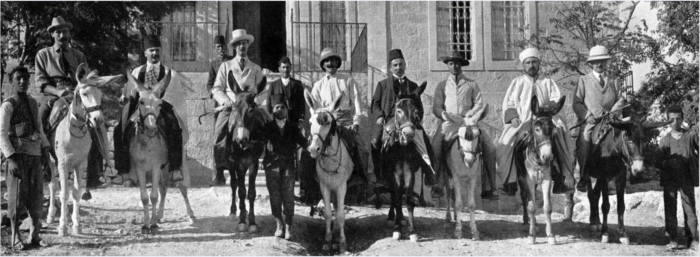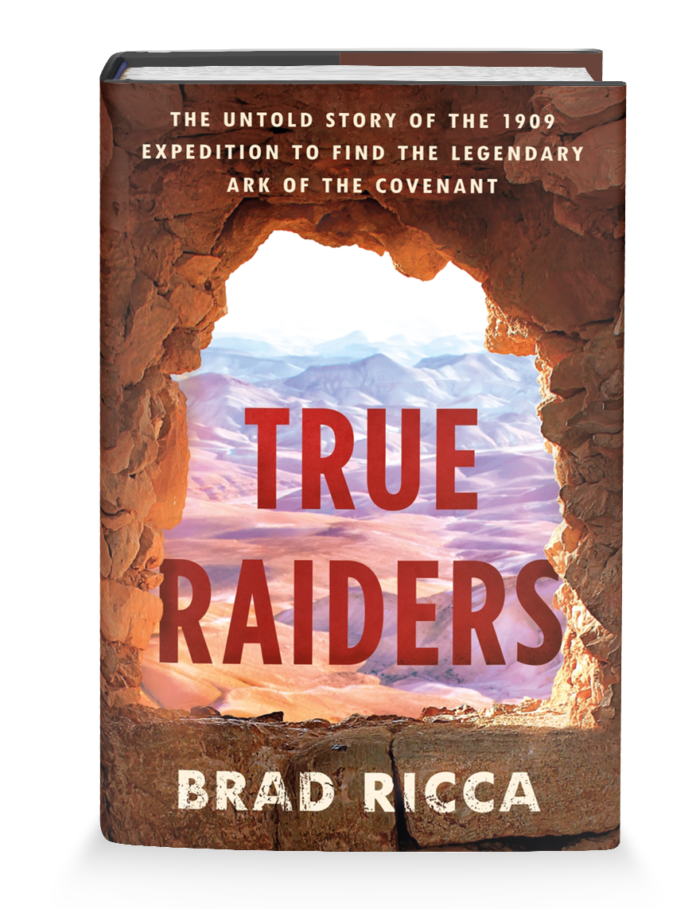by Brad Ricca
When I first learned that Raiders of the Lost Ark, my favorite movie, might have been based on an actual archaeological expedition, I felt like my face was melting off.
No way, I thought, as I instantly regressed to a default 1980s vocabulary. No. way.

I remember the first time I saw it. I was ten years old, in the old Westgate movie theater, a dark cavern of a place with billowing curtains hung on the walls. I sat in the red seats with my Dad and my little brother. We ate salty yellow popcorn and shared a 7-Up. It was the greatest movie I had ever seen. And I had seen Star Wars. I had seen Empire.
After I saw Raiders, I went all in. That Christmas, I got a JCPenney leather bomber jacket, and an officially licensed Stetson fedora (also from JCPenney). I even had a bullwhip I bought on a Boy Scout trip to New Mexico. I could never get the hang of it, not like him, but it didn’t matter. It looked cool. It was cool.
As the years passed, I saw many more movies that shaped and changed me. Yet Raiders still had a hold on me. What was it about that movie? It was more than the whip and the hat and Marion in the dress and the damn Nazis. What was it that had such a grip on me for almost forty years? It wasn’t nostalgia. That is always sweet, but fleeting. No, my deal with Raiders went deeper. Some of my understanding of it has changed with time: the raw colonialism of Jones in the field and the disturbing connotations of the Indy and Marion backstory. But there is still that lure of researching the impossible, of unclasping some gigantic leather book to see something that defies human understanding. That was the part I wanted to inhabit, to do. I try not to think about it too much, but I think I spent a great many lonely years earning a doctorate solely because of Raiders. I may not have been lost in Egyptian tombs or navigated ancient mazes, but I have found lost documents and have taught for many years out of cramped offices that resembled utility closets. And it was all great. But I never thought it would lead me to the Ark. Somewhere, I was disappointed not only that it hadn’t, but that I had foolishly believed it would.
Then I learned about Monty Parker.
His quest for the Ark is just one of those stories that nonfiction is made for, something so unbelievable that it can only be defined in terms of what it isn’t. The notion that in 1909, a rogue English nobleman signed on with a shadowy Syndicate to secretly hunt the Ark of the Covenant in Palestine is ludicrous – but it happened. That they were guided by a mysterious Finnish scholar named Dr. Juvelius using a secret cipher he found in the Book of Ezekiel is bananas – but it happened. And that their adventure crisscrossed into other infamous historical stories such as King Tut’s curse, the Titanic, and even a terrible set of streets in Whitechapel – this was just one of those stories.
I had to find out the truth of it. I had to. I first uncovered the facts by digging through the first-person accounts of expedition members, sealed government documents in Turkey and Israel, and the mysterious Parker Archive, the exact set of documents that Monty carried with him on the dig itself. That was the real treasure trove. At the same time, I realized that facts would only take me so far. The Ark of the Covenant is a legendary artifact that has not been seen – if at all – in over two thousand years. It is an object of speculation, mystery, and faith. To respect that uncertainty – which is the definition of adventure – and in homage to the movie, I tried to write a history not of the expedition itself, but of the stories surrounding it. To go after the Ark as a subject, I had to go all in.
True Raiders is my love letter to Raiders of the Lost Ark, but also to the conspiracy-minded genre of eighties properties like In Search Of, Amazing Stories, and Holy Blood, Holy Grail. For though I hope readers enjoy the adventure of the expedition, I also want to ask real questions about the intersections between fact, story, and truth. Did Monty really go after the Ark? Yes, he did. What did he find? That answer is more complicated, more uncertain, and will be up to readers to discover. I have my answer and I can prove it.
That feeling you have now is why I’ve always come back to Raiders. It’s that feeling I had, all those years ago in the theater, on that summer afternoon, with my Dad and brother, watching the impossible take place before us, glowing in an unearthly light. Because even though we didn’t know then that part of the story could have actually been real, been true, we somehow suspected, and hoped, that it might be.
Brad Ricca is the author of the Edgar Award-nominated Mrs. Sherlock Holmes, Olive the Lionheart, and Super Boys, winner of the Ohioana Book Award for Nonfiction. He won the St. Lawrence Book Award for American Mastodon. Ricca lives in Cleveland.



